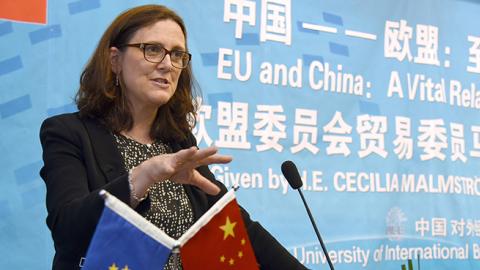p(firstLetter). Cecilia Malmstrom, the European commissioner for trade, surely felt relieved after her recent trip to the United States. In early March, U.S. President Donald Trump’s announcement that he intended to slap 10 and 25 percent tariffs on imported aluminum and steel, respectively, blindsided her and her colleagues. Shortly after, she crossed the Atlantic to plead her case directly to Commerce Secretary Wilbur Ross. The European Union, she explained over two days of meetings in Washington, should not be held responsible for a problem made in China. Back in Brussels, she learned that the president had agreed: The EU would be temporarily exempted from the metals tariffs after all.
“U.S.-Europe trade war likely averted, for now,” headlines blared. Less noticed, however, was a joint statement by Malmstrom and Ross announcing discussions on “trade issues of common concern.” Intentionally or not, Trump’s move had kick-started a broader negotiation over the future of trade. Brussels had purchased a temporary success at the price of a potentially dangerous strategic dialogue.
To be sure, Trump is fond of such power plays, utilizing leverage to coerce even the United States’ closest allies. For the past year, Trump has repeatedly and loudly bemoaned the U.S. trade deficit with Europe, which topped $150 billion in goods last year. However, while Europe has acknowledged the trend, it has done little to correct it. As one senior German official told me recently, he is focused on defending the status quo by rallying congressional allies. Another prominent German put it this way: “We just need to get through the next three years.”
In part, this sentiment stems from the European assessment of Trump as a capricious, if not downright contemptuous, U.S. president. As French President Emmanuel Macron put it in response to the tariff threat, “We will not talk about anything when it is with a gun to our head.” But the European attitude also goes beyond an analysis of the man himself, reflecting a broader calculation that Trump represents an historical anomaly. If opinion polls are to be believed, so the thinking goes, a new American president will take office in less than three years. A return to the past is in the offing, if only the continent can hold out long enough.
That would be a major miscalculation. Regardless of who controls the presidency, the United States will probably take a more competitive view of trade for years to come. This is true for two reasons. First, U.S. workers in states blighted by globalization are less convinced than ever that the relationship with Europe is sacred, let alone important enough to justify large trade imbalances. Almost 30 years after the end of the Cold War, the memory of a tightknit alliance fighting communism is fading, replaced by the image of two large blocs battling for jobs and market share.
But working-class skepticism, even hostility, toward free trade is nothing new. What makes the present moment unique is a perceived shift in the international distribution of power. In past decades, Americans considered running large trade deficits the sacrificial duty of a superpower. Increasingly, however, U.S. dominance of the post-Cold War order is slipping. As other blocs challenge the United States, the public will be more and more inclined to see relationships with other countries through a zero-sum lens. In the process, competitive nationalism will grow in popularity over free trade, especially if obstacles like non-tariff trade barriers are seen to disadvantage the United States. Already, such a shift in attitude is rippling across both parties: For years, Hillary Clinton was considered a staunch free trader. But in 2016, like the other three finalists for president, she reversed course. From Elizabeth Warren to Kamala Harris, no Democratic Party candidate with a viable path to the White House in 2020 is a true free trader.
For Europe, led by Germany, this poses a conundrum. The German economy is export-led, and international markets are the lifeblood of its manufacturing industry. By ignoring Trump, it risks a dangerous escalation. “When a country (USA) is losing many billions of dollars on trade with virtually every country it does business with, trade wars are good, and easy to win,” Trump warned last month.
Instead of confrontation, therefore, European countries like Germany would be wise to consider a two-pronged strategy of accommodation and reorientation. For starters, Germany should work to close the trade deficit with the United States without badly damaging its export industries, for example by lowering import barriers, raising its purchasing power, and curtailing excessive subsidies. This new posture would echo South Korea’s approach, which led to an update of the U.S.-South Korean free trade agreement just last month.
Second, Germany should join the United States in an offensive against Chinese trade practices. The recent Chinese purchase of 10 percent of automaker Daimler AG is only the latest in a series of moves that are causing concern in Berlin. Germany is waking up to the prospect of a broad-based Chinese effort to pilfer advanced manufacturing technologies from the West. Clearly, this is an area for trans-Atlantic cooperation. Just last month, Trump took aim at unfair Chinese trade practices, slapping retaliatory tariffs on Beijing with evident glee. By teaming up with the United States in this area, Europe can recapture the trans-Atlantic solidarity of yesteryear while simultaneously addressing a major threat to its economy.
In both substance and style, Trump is certainly an insurgent president. But it would be a mistake to dismiss his worldview as idiosyncratic — a passing fad merely to be endured and outlasted. If Europe and the United States want to maintain public support for trade in the decades to come, they must find a synthesis between the free trading dogmas of yesterday and the more nationalist impulses of today. Anything less will only clear the field for a truly dangerous revisionist: China.

















